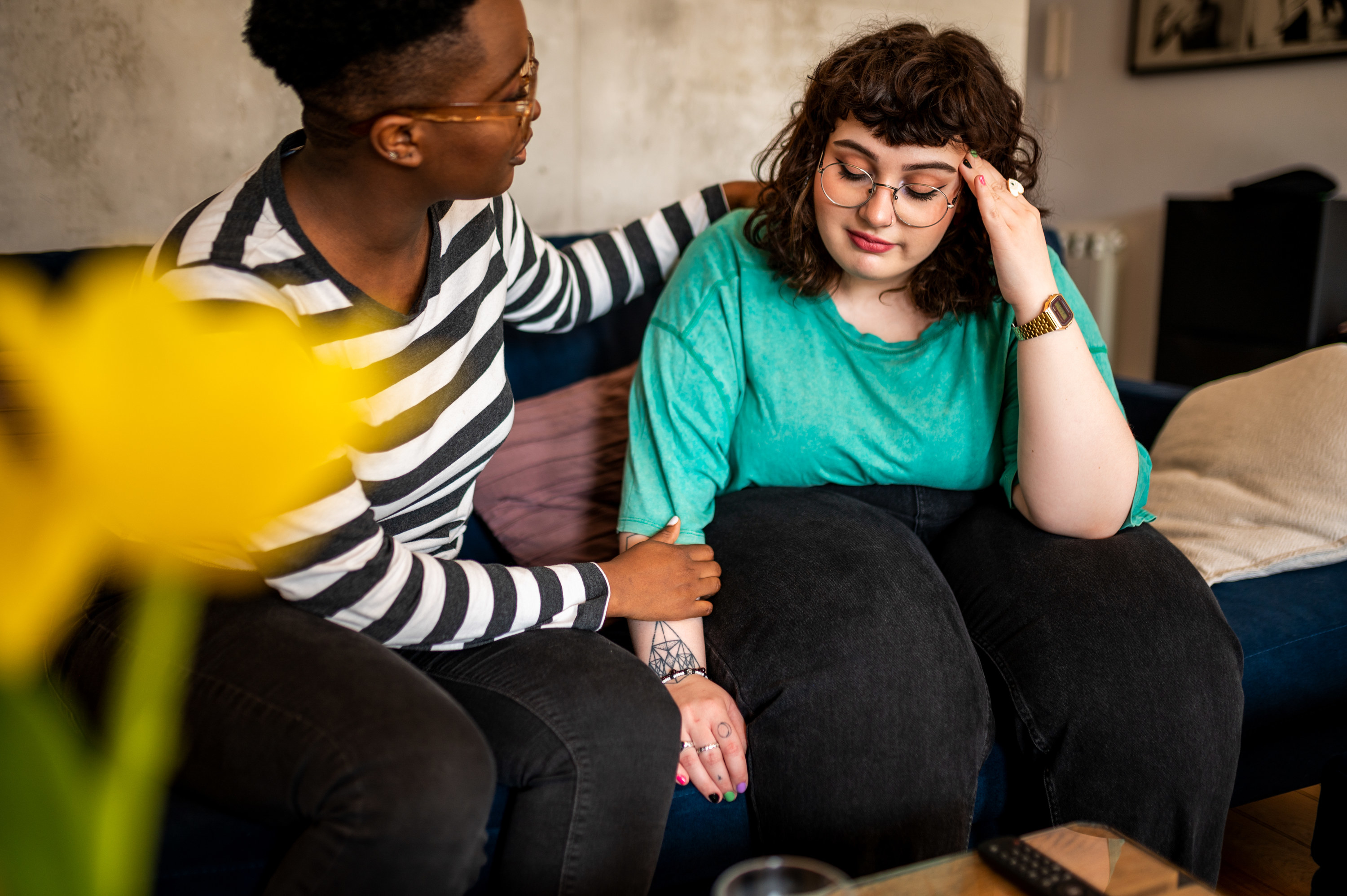While it may be true that everyone will experience a form of pain at least once in their life, there are some instances when the pain doesn't go away and becomes part of someone's daily life.

According to the Centers for Disease Control and Prevention, it was reported that in 2019, about 20 percent of American adults (or 50.2 million people) lived with chronic pain, which means they were living with some form of pain most days or, if not, every day of their lives. (And since this data was gathered before COVID, these numbers might even be higher today due to people having symptoms from long COVID.)
And since so many Americans are living with chronic pain, it most likely means that most people will know someone who is currently experiencing this right now.

But even if we may know someone who is living with pain, it still might be difficult to fully understand what they're going through or know how to best support them. This is incredibly true if the person is living with an invisible illness, which is a disease or condition that is not visible to others, such as endometriosis, Crohn's disease, hypothyroidism, and more.
So to better understand how we can best support those living with chronic pain, we reached out to both people currently living with chronic pain — plus a few experts in their fields.
The experts are:
• Dr. Ari B. Lerner, board-certified pain medicine specialist and board-certified anesthesiologist at Pain Management Specialist of New York.
• Dr. Carla Marie Manly, clinical psychologist and author of Joy from Fear.
• Dr. Mary Charles Haigler, doctor who specializes in orofacial pain and obstructive sleep apnea treatment.
Of course, not every tip will help every single person who is living with chronic pain, but, hopefully, this advice from medical and mental health professionals — as well as everyday people living with chronic pain — will be able to provide insight into your loved one's life, so you can begin the conversation with them on how they would like to be best supported.
"In short, a chronic pain condition affects all aspects of a person's life from their physical well-being to their social and spiritual life," Dr. Lerner told BuzzFeed. "There is a feeling of isolation and loneliness when trying to cope with the condition. With the support of friends, family, and caring professionals, they should feel a sense of hope knowing they are not in this alone."
1. Listen empathically rather than trying to “fix” the situation.
Dr. Manly refers to this as a type of "healthy emotional support." Since chronic pain can affect one's self-esteem and feelings of general self-worth, Dr. Manly says, "Offering nonjudgmental emotional support is often the most critical component of supporting someone who lives with chronic pain."
So while you may have the itch to throw every solution you know out there, it can become overwhelming for your loved one to hear. Yes, it might be coming from a thoughtful place, but sometimes, loved ones with chronic illnesses just need to feel validated — and the best way to do this is by simply listening to their worries and concerns.

2. Show "empathy with action," rather than being sympathetic with your words.
According to Dr. Lerner, while being sympathetic with your words is nice, showing "empathy with action" is more meaningful and can even "enhance a chronic pain patient's life and interpretation of their pain."
You can do this by "helping them with basic tasks that they may find difficult," she explains. "If the person has a physical disability coinciding with their pain, you may need to make things more accessible in their home and environment so they can continue to care for themselves. If they're unable to care for themselves, they may need assistance from their medical doctor and possibly a social worker to obtain the support they need, such as a home health aide or in-house therapy and nursing care."
Dr. Haigler adds by saying that you can even offer a specific gift or service: "[You can] provide a meal, offer to pick up their children, or run an errand. [This] may be easier [for them] to accept than an open offer of 'let me know if you need anything.'"
However, make sure to check in with your loved one before doing these tasks to see if they would actually like or need help in these areas of their life. While some chronic pain sufferers would appreciate the help, others might prefer to reach out themselves if they need anything. "Don’t assume that I can’t do something, whether it's a physical task. For a physical task, I’ll ask if I need help," says Megan, 34, from Chicago.
The only way you'll know how to best support them this way is by simply asking them what they prefer, and then continue doing that requested boundary.
3. Validate their pain and emotions.
One of the toughest things people with chronic pain — especially those who are living with invisible illnesses — go through is being invalidated by others about their pain and life. "I think people with chronic pain, like myself, worry a lot about whether or not others in our lives believe us or think we're exaggerating," said a BuzzFeed reader who wanted to remain anonymous. "It's the opposite. We're downplaying our pain....We're so used to coping that we might seem fine even when we're in a lot of pain."
According to Dr. Haigler, these assumptions about pain tend to happen because "most people have trouble understanding that pain can affect life on many levels." That's why she suggests letting your loved one know that "you care, that you believe that their condition is real, and that you see how it's affecting them."

4. Try not to assume their needs — and gently check-in instead.
Even though you may know your loved one like the back of your hand, it's important to be curious about how they feel and not assume what their pain feels like on any given day. "Since those who live with chronic pain may feel very different on a day-to-day basis, it’s wise to do gentle check-ins," says Dr. Manly.
One of the ways you can do a gentle check-in is by simply asking about their pain level. "I find it helpful to use rating systems, such as a 0 to 10 pain scale (0 = no pain, and 10 = the highest pain imaginable) that can be used to gain objective insight into a person’s needs," says Dr. Manly. Being aware of the amount of pain they're feeling will not only give you insight on how to best support them but also give you awareness of when not to take things too personally if they're not feeling 100 percent.
5. Ask open-ended questions.
Supporting a loved one often means becoming curious about their lives and their struggles. Rather than asking the go-to "how are you" question, Dr. Manly suggests asking open-ended questions to get a further understanding of how they are truly feeling. If you're not sure what kind of questions you should ask, Dr. Manly provided a few below.
• Would a little bit of exercise make you feel better or worse?
• Is your appetite strong today? Would you like a bowl of soup?
• When your pain is high, what could I do to support you?
• Do you prefer to be alone and quiet when you’re hurting so much, or do you prefer company?
It's also important to keep in mind how they're responding to some of these questions. If they're changing the subject or keeping their answers short and sweet, it just might mean they're not in the mood to discuss their pain right then and there — and that's completely okay. Just respect their boundaries and talk about something else.
"In truth, those who suffer from chronic pain often have limited emotional energy and may feel depleted when asked to talk and engage," Dr. Manly says. "That said, on 'up' days, there may be a desire for more engagement than on days that are particularly difficult and draining."
However, if you want to take things up a notch, you can also educate yourself about their chronic illness on your own time to help you further understand what they are going through. "Feel free to educate yourself on our chronic illness," said a BuzzFeed reader who wished to remain anonymous. "The fact that you have an idea of the condition we are dealing with for the rest of our lives, shows us you care about us."
6. Be mindful of how much support you offer.
While it's incredibly important to offer support, you also want to be mindful of how often you're offering advice or help, since, according to Dr. Manly, it's common for chronic pain suffers to become stressed about their ongoing health issues — and we, as loved ones, don't want to accidentally make things more stressful.
"A chronic pain sufferer can feel flooded or overwhelmed if offers of support are too frequent, intense, or demanding," says Dr. Manly. "As such, it’s very important to tailor offers of support to the individual’s current needs and mental state." Some of the ways you can tailor your support are by being mindful of their boundaries, asking open-ended questions, or asking about their pain level using the pain scale technique.

7. Try to be aware of your own behavior.
When you're talking with a loved one who lives with chronic pain, try to remember to be mindful of discussing certain topics. For instance, Dr. Lerner says, "This may not be the best time to talk about your latest vacation or activity you enjoyed, as it could only contribute to their sense of isolation as they may not be able to participate."
She adds: "You should also avoid discussing that friend or acquaintance who had an injury but eventually recovered. Although this may seem like [you're] offering hope, it can be interpreted as them being the one poor soul who suffers while others recover."
Of course, this doesn't mean you can't talk about the happy things that are going on in your life, as your friend most likely wants to hear about them, but Dr. Lerner just emphasizes that when you're talking about their condition, it's can be more helpful to focus on how it's affecting them (if they feel comfortable talking about it), which can provide insight on how you can continue to provide support and take action.
8. Continue inviting them to events and outings.
When someone develops chronic pain issues later in life, not only does their relationship with their body changes but also, the relationships they have with their loved ones can, too. That's why it's so important to still invite them out — even if you believe they will turn the event down. Why? Because it's not your job to make the choice for them. They're equipped to make this call themselves and they still want to feel included in your life.
"Please don’t stop inviting us to outings, even if it’s basically guaranteed we won’t feel like going," said Brittany. "Losing that inclusion is a whole other pain that adds on to how much we struggle daily."
If they do turn down an invite, please don't get upset. Having empathy and understanding for their pain is incredibly important not only for your relationship but also for their mental health, too. "I've lost a lot of friends after they got annoyed because I kept canceling plans — they assumed I was just avoiding them," said knightowl86. "I'm not just struggling to function because I'm in constant pain, [but I'm also] battling mental health issues."

9. Keep showing up.
Even though there are dozen of things you can do for someone who is living with chronic pain, one of the best things you can do is to simply show up again and again. According to the chronic pain sufferers who responded to a previous chronic pain post, one of the most common things that was said was that they don't want to feel like a burden to their loved ones.
"It can be hard to let friends and family in to support you without crossing the line of feeling like a 'burden,' explained Ari Negri, 26, from San Diego. "Remember to check in. It can get really lonely dealing with [chronic pain] from day to day. Sometimes we just need to know that we’re still on our loved one’s minds."
But what exactly does "showing up" mean? To put it simply, it means not giving up on them. Period. "I want people — mostly my parents right now — to stop giving up on me every time it gets hard," says a 30-year-old female from Chicago. "It’s awful when your loved ones say: 'Maybe we’ll never get answers.' But that can never be an option for me. I’ve been fighting for two-thirds of my life to not feel this way. To accept that I will just have to live like this is unacceptable...So when my own family gives up like that, it’s really hurtful."
So instead of giving up — show up. "Watch my stupid shows with me on bad days, don't judge if I haven't been able to shower or straighten my apartment for a few days, and offer to cook and or clean up a little bit.," said Chelsie Cash, 30, from Georgia. "Small help goes SO far, and so much of chronic illness feel isolating."
